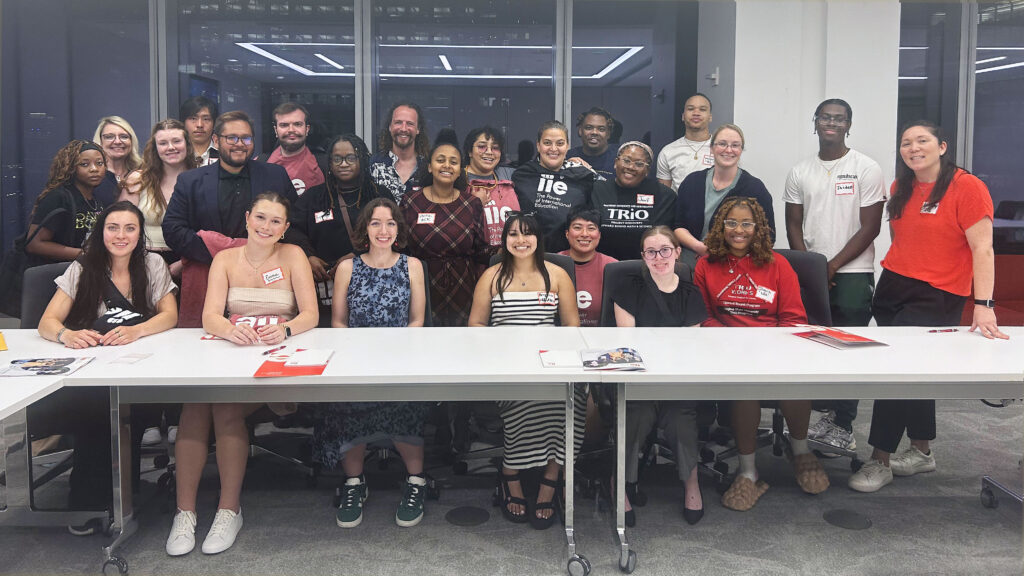IIE’s Center for International Opportunities is Prioritizing Partnerships to Reach Underserved Populations
International education offers a myriad of opportunities, but not enough students know about these opportunities or have the financial means to pursue them. This year, the IIE Center for International Opportunities set out to work with the people and organizations that have established trust and proven approaches among student populations—from low-income to first-generation college students. The 2024 shows that 34% of U.S. study abroad students identified as students of color in 2022/23, despite students of color comprising 48% of national student enrollment. First-generation and low-income college students are also lack opportunities to study abroad.
In the spirit of IIE’s International Education Week theme of embracing connections this year, we’re looking back at our collaborations this year and looking ahead to maximize impact in the next.
We started strong in February when we officially partnered with the Council for Opportunity in Education (COE), which supports federal programs delivering college access and retention services to nearly one million low-income, first-generation students and students with disabilities each year. Our goal: to make sure these students—and faculty and staff who influence them—know about, and take advantage of, the international side of higher education. Over the summer, I met with members of the COE network to inform them about the American Passport Project and other resources. Along with the Center’s summer intern, I also met several first-time study-abroad students before and after their travels to assist them with contextualizing their study-abroad experiences within their academic, career, and personal goals. Studies show that students who clearly articulate the relevant goals and outcomes of their study-abroad experiences reap greater rewards in their careers.
The Hispanic Association of Colleges and Universities (HACU) represents more than 500 colleges and universities, which are home to two-thirds of all Hispanic college students in the U.S. This fall, the Center initiated a framework for cooperation between our organizations to expand opportunities in international education for both Hispanic-Serving Institutions and Hispanic identifying students. The Center and HACU’s Institute of Global Engagement are coordinating to promote programs and services, develop and share informational resources, and participate in conferences, meetings, webinars, and other events that amplify thought leadership.
This year, building on the partnership we initiated with the nonprofit Leaders of the Free World(LFW), the Center co-sponsored several LFW engagements and its signature LFW Fellowship, which includes a summer term in Ghana. We sponsored a LFW fellow to participate in the Ghana program, as well as an IIE team member to serve as an LFW mentor during the fellowship and trip. By focusing on a culturally responsive curriculum, LFW ensures that fellows see themselves reflected in the curriculum and leadership models. We recently shared our learnings from this year’s activities during the Global Inclusion Conference; I joined Lavar Thomas and Ruby Maddox, LFW co-founders, to lead the session titled, “Increasing Black Male Engagement in International Education.” In 2025, we are looking forward to producing a Supporting Black Male Students in International Education Resource Guide, supporting the next Black Men in Global Leadership Summit in February, a webinar series to kick-off in late Spring 2025 to share information and resources for Black men pursuing global education as well as leadership and career opportunities, and hosting a networking event to build professional connections.
The Center, as part of its long-term partnership with Dickinson College, has been cultivating a community of practice for higher education professionals to reimagine an international education framework that incorporates global, intercultural, and equity and inclusion lenses. This year, we initiated, “What Next? A Dialogue on Equity and Justice in International Education,” a global dialogue series building off what we’ve learned in previous years to discuss how we have changed and how we measure success. This regional approach values the nuance of geographical contexts while also comparing each conversation’s themes for throughlines. These critical conversations are contributing to a growing body of knowledge and practices that will help inform decisions about the future of international education, which we will be publishing outcomes next year. We have conducted dialogues for North America and Europe and look forward to additional regional conversations in 2025.
The IIE Center for International Opportunities wishes a happy International Education Week to all and is grateful for the collaboration and support we receive to actively address the importance of creating, elevating, and expanding opportunities in international education!
